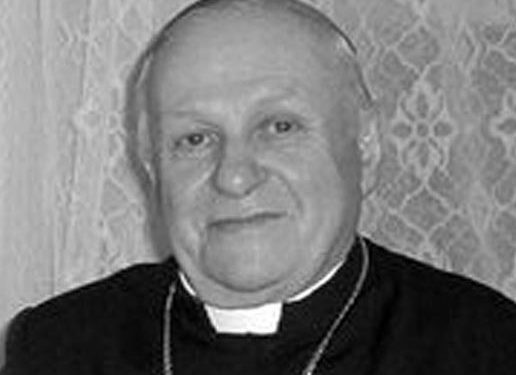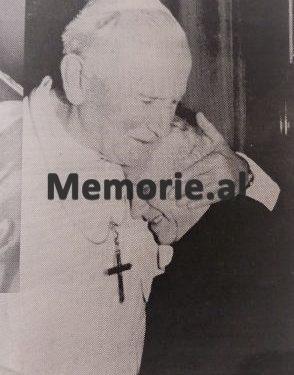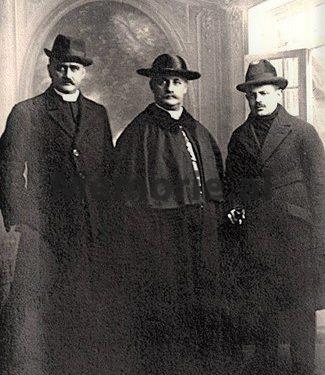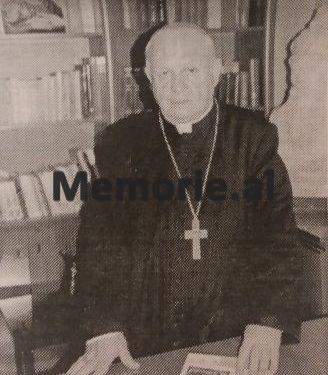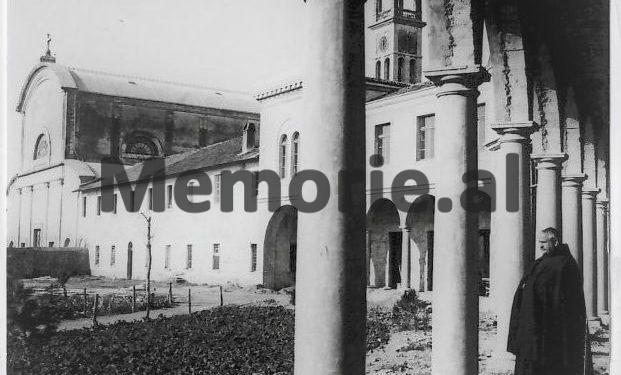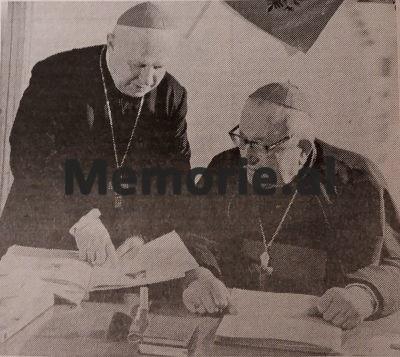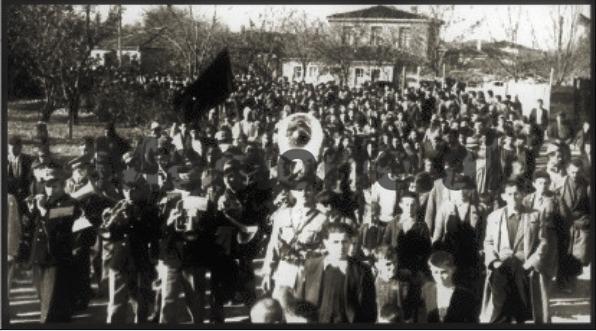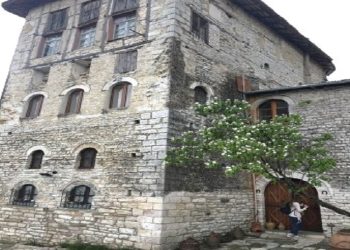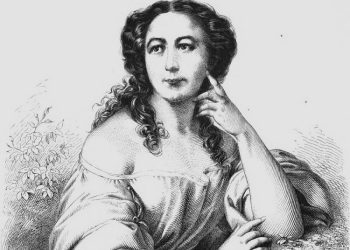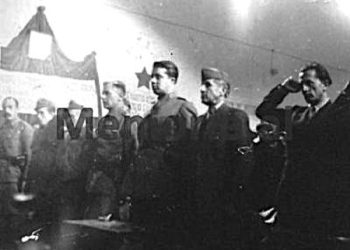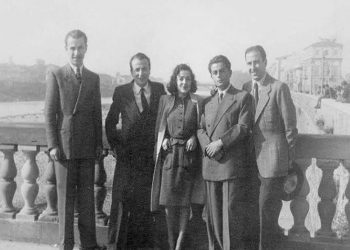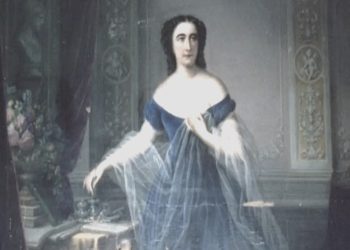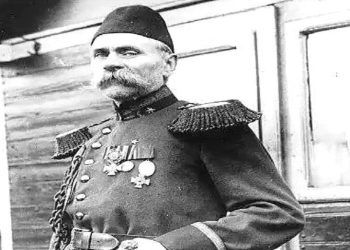Dashnor Kaloçi
Memorie.al/publishes the unknown story of Monsignor Zef Simon from the city of Shkodra, who after attending the ‘Infant’ School, which was near the Church Cell and was led by the Servite sisters in the city of Shkodra, attended classes at the Lyceum “Ilirikum” Of the Franciscan Assembly, which he failed to complete, because the communist regime of Enver Hoxha closed religious schools in 1946. Zefi graduated from the Higher Pedagogical Institute in Tirana with a degree in Language and Literature and his work as a teacher in the Commercial School of the city of Shkodra, where in addition to teaching, he found time to devote himself to the priesthood, studying theological and philosophical lessons in the Archdiocese of Shkodra, where in 1961 he was secretly ordained a priest. His arrest in 1976 after the State Security found many religious materials and documents buried in the garden of his house, he was sentenced to 15 years in political prison, of which he suffered 12 years in the camps of Spaç, Zejmen and Saranda, releasing them in 1988. Monsignor Simon’s passion for literature and history, where in a few years he managed to publish over ten books, such as: “Life of Our Lady”, “Life of St. Joseph”, “Light in the Dark” , “Persecution of the Catholic Church in Albania, year 1944”, (a work written by him in Italian and French, in the years 1996 – 1998), “A boat in history”, “Our homeland”, “Events on earth” , “Portraits of Catholic Clergy”. etc., and his ordination as Bishop by Pope John Paul II on April 25, 1993 in the city of Shkodra.
“In the book ‘Freedom’ I wrote with optimism, that the death of the dictator, gave us hope and optimism, that change would come if no new circumstances arose, as it was difficult to escape from communism. I have dedicated this to my hometown, Shkodra, an old and important city in Albania and the Balkans. One work that I wrote with a lot of pain, was that this city, with some culture and art, with beautiful traditions, and with leaders of good thought, managed to have a ban on its activity, in the time of communism and that he set foot, for political purposes, and persecuted with planning the whole city, especially the Catholic Clergy. “This is what Monsignor Zef Simoni from the city of Shkodra, one of the four Catholic clergymen who, in the preface to one of his works, said. were ordained Bishops by Pope John Paul II himself, on the occasion of his visit to Albania on April 25, 1993. Regarding the life and literary work of Zef Simon and his persecution by the communist regime of Enver Hoxha, we will be known in this writing according to the testimonies he himself gave us a few years before he was separated from this life.
Special event in Col. Simon’s family!
“One night, a few hours after St. Andrew’s Day, on December 1, 1928, in the family of Col. Simon Monit in the city of Shkodra, there was a special joy from the birth of a child, who would be baptized with the name Zef. This great joy in this family and in the whole tribe of Kol Simon Monit, was for the reason that two years ago, to the new mother Gjystina, two other children were born (Toma and Rozina), but who had no luck. to live after they had joined the angels. Two days after that great event, the couple Kola and Gjystina, followed by their two young children, Çiljeta and Gjergji, would go to the suffering parish of the city of Shkodra, for the baptism of their newborn son, by his godfather, Luigj Pjetër Toni.
Childhood and schooling in religious colleges
Thanks to the religious culture inherited from his family, Zefi as a child would grow up more in the Church premises, where at the age of 4, he would enter the Infant School, which was located near the Church Cell and was run by sisters, Servite, of the city that, as Zefi recalls, “were real teachers”. Zef Simoni would attend primary school in his hometown in the city of Shkodra, in the “Skënderbeg” neighborhood, while he would attend high school at the “Ilirikum” High School of the Franciscan Assembly of that city. The passion and great desire with which Zefi continued the religious school, would not last long, for the reason of the closure of those schools in 1946 by the communist regime of Enver Hoxha in power and for this reason, the lessons of the high school Zefi would finish them in the state high school, “Father Gjergj Fishta”. As Zefi recalled, “Skënderbeg School was very poor and with few teaching aids, but with a very large work of the teaching team that made a great deal of knowledge radiate to the students who attended this school.” In Zefi’s memory, for the past years, the behavior and culture of the teachers would impress him, and in particular the director of that school, the most correct man in life, Pjetër Troshani. Regarding the period when she taught at that school, among other things, Zefi recalled: “We students were very proud to study there, for the very name it bore (” Gjergj Kastrioti Skënderbeu “), where every November 28, the Day of the Great Holiday of the Flag, we made all the preparations for its celebration. “There we expanded our knowledge and culture, opening new horizons, not only in Christian religious culture, but also in the modern pedagogy of the Swiss Pestalozzi and the best schools in Western Europe.” In this environment, that over the years, taking with it the joys and desires of the feminine age, the prayers in the church, which he began to receive as a child and to attend regularly and from the family upbringing they had inherited, Zefi showed “We were proud to be the daughters of those wise parents.” This family was known by all Shkodra residents for their devotion to religion and celebration, especially of religious holidays. A great nostalgia stemmed from Zefi’s soul, when he remembered his pedagogues and teachers in the gymnasium, such as: Zef Kurti (Albanian language teacher), who was also the leader of the city music band and professor of Mathematics, as he liked to call him Zefi, Mr. Kol Margjini, the honored teacher and citizen. During his time at that school, Zefi recalled: “I was looking forward to going to church on Sunday, to being found at my crusade, to seeing my friends, whom you loved so much. But it was a day only once a week, and that day passed quickly. “With inner suffering, you lived in a world that never worked for me.” At that time, having a beautiful voice and melodious timbre with subtle sensations, Zef Simoni, who early would attend the Chorus of the Franciscan Church. The miracle for Zefi in the choir would be the accompaniment of the world song “Schtille Nacht” (Quiet night) on the occasion of Christmas, where he conducted the professor, Sander Filip Mazreku. Zefi also gladly joined the “Antonjane Society”, well known in those years, which consisted of about 700 members, under the direction of Father Gjon Shllaku and Father Mëhill Miraj, where they were organized in addition to celebrating religious holidays and activities of various cultural-sports and artistic.
Monsignor Zef Simoni: The arrival of the communists in Shkodra and the strike of the Clergy
“With the triumph of the communists and their coming to power at the end of 1944 and the beginning of ’45, in the city of Shkodra began a really big blow for the Clergy, especially the Catholic one, which immediately after a cooked strategy in the kitchens of Slavo-communist and anti-Catholic sadism, he immediately undertook reprisals “, Zef Simoni recalled, saying: with machine gun fire, shooting men behind the walls of Catholic tombs, making the dawn sad and the day oily and painful. Thus, the city, remembers Dom Ndre Zadeja, the nationalist of the melodramas of “Rozafa” of “Siege of Shkodra”, was strong that dripping the blood of “Red Rub”, waited for the times of the nation around our castles. The first martyr, Dom Ndre Zadej, Dom Lazër Shantoja, was shot and Padër Xhiovani Fausti and Padër Daniel Dajani were arrested, together with the seminarian, Mark Çuni, a civilian and a Catholic, along with 11 other people. After this terror of the communists, it followed with other very painful events, with arrests, torture and slander, that the weapons were found in the Franciscan Church of Gjuhadol of Elteri i Shëna Ndout, where the Franciscans were arrested, Padre Donat Kurti, Padre Aleks Baqli, Father Pal Doda and Father Zef Pllumbi”.
Priesthood and literature, the passions of Monsignor Zef Simon
After graduating from the State Gymnasium “Father Gjergj Fishta”, Zef Simoni were appointed teachers in primary schools and later in the seven-year schools. In addition to priesthood, another great passion for Zefi would be literature and various translations, which he would deal with when he continued and graduated from the Higher Pedagogical Institute in Tirana, in the branch of Language and Literature. After graduating with honors from that Institute, Zefi was assigned to teach Language and Literature at the Commercial High School in the city of Shkodra. In parallel with these studies, Zefi would dedicate himself to the lessons of priesthood, his early will, doing theological and philosophical studies, for five years, at the Archdiocese of Shkodra and managed to be ordained a priest secretly at the beginning of 1961. Zefi will show his passion for writing from his childhood, with various writings not only with religious content, but also beyond.
1976, arrest and sentence of 15 years in prison
During the time of the destruction of the Churches and then until the day of his arrest, Zefi would continue his passion, various writings and especially short prose, which he loved very much and which he had started at a young age. These various writings and translations, which he had written, he would bury in his backyard, anticipating his arrest as imminent. And so, it happened, because ten years later from the time when the communist regime had closed down and most recently religious institutions, it would be the turn of Father Zef Simoni to be arrested and sentenced to 15 years in political prison. After his arrest, the State Security would conduct a strict search of his apartment in the city of Shkodra somewhere near the “Big Nut”, digging in the garden around the house, until he found traces of those writings that were seized. and never returned to the author. Zefi would keep his passion for writing throughout his sentence, keeping his works in his memory, not being able to write or publish them. Father Zefi was sentenced to 15 years in prison in Spaç, Zejmen and Saranda and was released only in 1988.
Ordination of Zef Simon as Archbishop by Pope John Paul II
With the fall of Enver Hoxha’s communist regime, Zef Simoni, together with his brother Gjergji, returned to religious services and based on the great contribution he made in the early 1990s to the restoration of cult objects and the revitalization of life. religious, on April 25, 1993, he was one of the four Catholic clergy who were ordained in the Cathedral of Shkodra by Pope John Paul II, on the first visit of the head of the Vatican Holy See to Albania at that time. In addition to this high task of the religious hierarchy, Father Zef Simoni, would continue his early passion, in the field of letters with a great production, managing to publish in a few years 10 works written in prose, such as: “The Life of Our Lady”, “The Life of Saint Joseph”, “Light in Darkness”, “Persecution of the Catholic Church in Albania, year 1944”. (This work was written by him and in Italian and French, in the years 1996 – 1998). “A boat in history”, “Our homeland”, “Events on earth”, “Portraits of Catholic clergy”. These are some of the books that have been published by Zef Simoni in these years and in addition to these, he has published many different articles in the religious magazine “Kumbora e e Diellës”, which was founded by Cardinal Mikel Koliqi, in 1942 In this magazine, Zef Simoni, had started to publish his first articles, which were edited by Mikel Koliqi himself.
Zef Simon’s work “Portraits of Catholic clergy”
One of the published books of Monsignor Zef Simon, is the work “Portrait of Catholic Clergy”. In this book that Father Zefi has published in French and Italian, he portrays 50 Catholic clergymen, his former colleagues, who, as he himself states: “It presents us with a space of almost a hundred years of our history, truly remarkable men who have worked in their lives in three directions: religion, homeland, and in the field of Albanian letters. It is about the Catholic Clergy, who in those turbulent and dark times, always difficult slavery, had the form of organization, poured hard work and sweat and gave life, for the flourishing of religion and the happiness of our homeland. The Catholic clergy, has opened the doors of Western civilization and is strictly stuck there. The Catholic clergy have worked hard in this direction and where more and where less, is Christianity, which has its own culture as Father Gjergj Fishta says, in an article of his own, entitled “The Catholic Church, has formed the western culture “. But in this book, we have presented some brilliant figures, who remain living lights, to give beauty and renewal of truth to the whole nation. Here we cannot ignore the working people and the pen, who have given a positive direction to Albanian life. Religion and homeland are the most interesting motives from which such virtues and ideals derive and such efforts bring the results of all the good that come. All these people have worked without boasting, these sons of mountains and fields from the historic city of Shkodra, are lined up one after the other, to have the feeling, ideals and formation of Christianity, to begin with its origin, St. Paul, an apostle associated with The Roman mother church, with the center of European culture, to hit Albania positively, for religion and homeland. Release like the giants, to give the place, the construction of a modern outfit, without slipping anywhere, in their walk. They elaborated the Albanian language and gave it the pearls of Albanian poetry. From this contingent came the writers in the first line of Albanian literature. Dom Ndre Mjeda, Monsignor Vincens Prendushi, Father Gjergj Fishta and many others. Given your schools and their high schools, at European levels, among boys and girls and with excellent and well-chosen magazines such as “Hylli i Dritës” and “Leka”, participate in Albanian life and give you light. These people, who are a large and continuous block, are known by Albanian history, they know our times. The Catholic clergy cannot be easily harmed in any way. There may be shortcomings and mistakes, among people, but the Catholic Clergy has its significance in the history of our nation. “Regarding this work of Dom Simon, the well-known scholar, Kolec Çefa, who also introduced the book, says “Bishop, Zef Simoni, who has made this book, is giving us in hand, not studies, nor biographies, nor criticism, but accurate thoughts and memories with accurate data, and fair assessments, which help us to know they push us to love, they educate us to resemble their loudly speaking example. The merit of the clergy was that he worked for Albania, without leaving foreign and domestic territory, without escaping economic oppression and poor living conditions. The clergy did not think and worked, being high officials of the Sultan, like the patriots Ismail Qemali and Pashko Vasa, but in Mirdita, as Abat Doçi, and in Lura as Dom Nikoll Kaçorri, and in Lezha as Imzot Bumçi. He did not write in foreign capitals, such as the great Çajupi, Frashëri, Shiroka, Asdreni, but in the villages of Albania, such as: Nikaj, Palaj, Sirdani, Prendushi, etc. The Catholic clergy did not live in exile, like Noli and Konica, but worked in Kukël as Mjeda, and Troshan as Fishta.
The book “Our Homeland” by Father Zef Simon
Another work of Monsignor Zef Simoni, is the book published in 1996, entitled “Our Homeland” (Panorama of Albanian literature), where in the introduction of this work, it is stated “Even these short works that I collected in this book, I wrote to him in prison, without using a pencil or paper, but only a piece: “A look at education in Albania” and the preface, which I wrote after I got out of prison, along with the sadness and pain I went through in prison, on the body, like the years I was convicted for “agitation and propaganda”, or other articles with more sentences, or the death penalty, in the Spaç prison in Mirditë, where there were 5 sieges with a clone, with the military unit with guards many, with helmets on their heads, without going inside, without seeing the door where they would be imprisoned, especially young people who boasted of ideas, which they sought to have as support, to face the daily war , in that pit of human misery, why was it really a pit between the mountains, where pyrite was extracted from the mine. Filled many times with human fantasy, man also made reflexes that in the fantasy of the most optimistic, were preparations for the future. Apart from the religious thoughts and writings with which I spent my life during my 12 years in prison, given the binomial “Religion and Homeland”, it occurred to me to present something clear about the homeland. He came to me everywhere with stories of disasters, invasions, guilt and heroism, but without lacking the light of hope and the efforts of the well-wishers. I wrote 5 pieces in prison, entitled “Our Homeland”, “Shkodra”, “Freedom”, “Progress of our nation” and “A few words about our literature”. Now I am writing the sixth: “Education in Albania”. I worked on the preface outside the prison. I have tried to present figures of patriots, martyrs, writers and intellectuals, giving a social analysis, about our dangers, wounds and currents. Even the ideas of the French Revolution spoke of these freedoms and ideas of the Enlightenment, which paved the way for materialism and communism, especially in Albania, to cause suffering and ruin. I have described these ideas in “Freedom” and “The Progress of the Nation”. In “Liria” I wrote with optimism, that the death of the dictator, gave us hope and optimism, that change would come if new circumstances did not arise, it was difficult to escape from communism. I have dedicated this to my hometown, Shkodra, an old and important city in Albania and the Balkans. One work that I wrote with a lot of pain, was that this city, with some culture and art, with beautiful traditions, and with leaders of good thought, managed to have a ban on its activity, in the time of communism and that he set foot, for political purposes, and planned to persecute the whole city, especially the Catholic clergy. “After all these publications, although in old age, Monsignor Zef Simon continued to work with great dedication, as in the activity of His priest as Bishop and also in the field of letters, how to make up for lost time. Thanks to the wide culture, he has represented the colors of the Albanian nation and the Catholic Church martyred by the communist regime, in many meetings and religious and cultural symposia , delivering many sermons on Christianity in Albania, and a series of topics organized by the Holy See, all of which Monsignor Zef Simoni continued until he closed his eyes permanently to his home in the city of Shkodra and parted from this life on February 21, 2009. /Memorie.al




